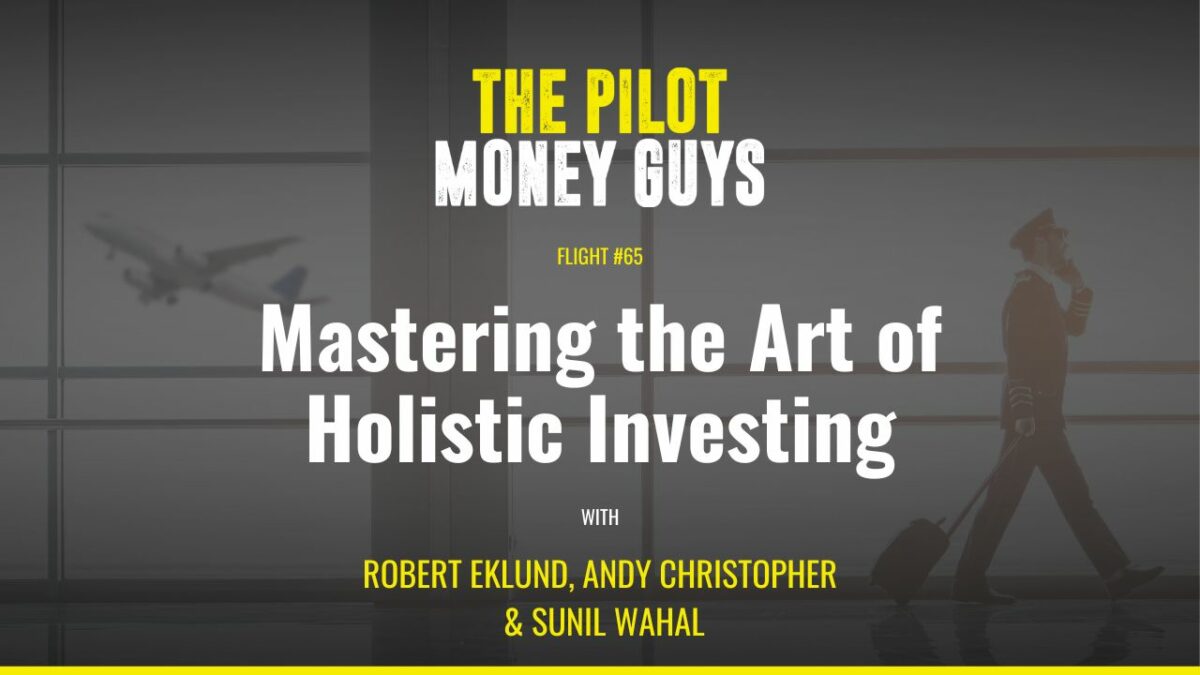
From Runway to Retirement: Savings Priorities for Airline Professionals
Author: Nolan Clark
The world of savings priorities and the newest financial strategies can be overwhelming, especially when each seems to have its own rules. I’m not here to push a one-size-fits-all approach, but rather to offer a fresh perspective, specifically with airline professionals like yourself in mind. Whether you're an FO aiming to strengthen your emergency fund and tackle debt, or a captain looking to maximize tax-advantaged accounts beyond your 401(k), the goal is to focus on strategies that fit your unique situation and goals.
Below is a great list of long-term savings priorities for retirement that I will reference in this article, sourced from a comprehensive report by JP Morgan Asset Management. For a deeper dive, visit J.P. Morgan Private Bank (jpmorgan.com) to explore the full guide.
Let’s dive into what really matters for you as a pilot and how you can make the most of your financial journey.
1. Emergency Reserve
An emergency fund is essential for everyone, regardless of your life stage. It may not be the most exciting savings goal, but it's crucial because it's not a question of if you'll need it, but when.
When looking up advice on a “healthy” emergency fund, you'll often see recommendations of 3-6 months’ worth of non-discretionary expenses. This typically covers essential costs like food, utilities, and housing. While this guideline works for many, it's not one-size-fits-all.
As airline pilots, you know first-hand the volatile nature of the airline industry. Therefore, considering a larger emergency fund—6-9 months or even up to a year’s worth of expenses—might be more appropriate to navigate unexpected challenges.
While this is a large amount of savings for many, the value of this step in all the priorities will be greater than the dollar value in your account. We see it time and time again with our clients who have the liquid savings to weather major storms that have a peace of mind in difficult times compared to those without. Tough times are already hard, we don’t want them to be any harder for you than they have to be.
To help get some momentum, you can set multiple emergency fund goals along the way until you reach the ultimate number that works for you and your family. Having enough money saved to cover all your insurance deductibles is a great start, then you can work towards 3-6 months saved, 6-9 months, and so forth.
2. Maximize Your 401(k)-Employer Match
Your employer match is one of the closest things to a "free lunch" in investing you’ll ever receive! Find out what percentage your employer matches up to, match your 401(k) percentage to that, and reap the benefits!
3. Pay Down Higher Interest Loans (Loans with Greater Than 7% Interest)
Most people understand the impact of high-interest consumer debt and how it hinders savings goals. The real question is why people fall into debt in the first place. From what we see, it often comes down to lacking a solid emergency fund and not planning for large, foreseeable expenses such as crash pad costs, commuting expenses, changes in lifestyle when you upgrade, or other future costs. Without these savings, people may turn to high-interest credit cards when unexpected costs arise and it makes them feel more behind financially, even though they are making more money than ever.
Here are a few questions to consider on this topic: (adapted from an article on the Financial Order of Operations written by The Money Guy Blog):
• Does my mortgage count as high-interest debt?
Unless you were fortunate enough to lock in a mortgage rate that you can count on one hand, you may be asking if your mortgage qualifies as high-interest debt. My wife and I bought a home this past year and have a 7% interest rate. Does this count as high-interest debt? While the interest rate itself does meet the 7% or greater criteria, there are a few reasons I may still count our mortgage as low-interest debt, and not be as adamant about making huge extra monthly payments. First, homes are typically appreciating assets, a distinct difference from consumer debt, student loans, car loans, etc. Mortgage interest may be deductible if you itemize your tax deductions. This could be even more of a consideration as the current tax laws expire in 2026 and the standard deduction will not be as large as in years past.
• Which high-interest debt do I pay off first?
Mathematically, paying off your debt with the highest interest rate first makes the most sense on paper. However, I am a big believer that the best debt repayment plan is the one you will stick to. If paying off smaller debts first motivates you more, you can start with those to build momentum. Just remember to consider the type of loan, minimum payments, penalties/benefits with paying off early/late, tax implications, and most importantly, your goals before you decide one way or the other.
4. Health Savings Account (HSA)
For couples entering retirement this year, it is projected they could spend roughly $315,000 on healthcare alone during their retirement period, according to the annual Fidelity Retiree Health Care Cost Estimate. This sum doesn’t include long-term care, over-the-counter medications, or dental services.
$315,000! That is a whole lot of money out of a retirement portfolio. Thankfully, there’s a specialized account designed to handle medical expenses: the Health Savings Account (HSA). An HSA offers triple tax benefits: contributions are tax-deductible, earnings grow tax-free, and withdrawals for qualified medical expenses are also tax-free.
To qualify for an HSA, you must be enrolled in a high-deductible health plan (HDHP), which typically has a lower monthly premium but higher out-of-pocket cost. Additionally, HSA funds roll over from year to year, allowing your savings to grow over time. However, be aware that withdrawals not used for medical expenses may incur taxes and penalties.
Lastly, while many people use HSAs as a fund for current-year medical expenses, an even better strategy could be to keep your funds invested and save your receipts for future use. Depending on your employer, you may also have access to other types of health savings vehicles, such as United's Health Reimbursement Accounts (HRA) and Retiree Health Accounts (RHA).
We discuss this in more detail on our YouTube Channel: United Pilots: RHA & Healthy Fear of Healthcare Costs
5. Additional Defined Contribution Savings
For 2024, the IRS Defined Contribution Savings Limits are:
• $23,000 for those under 50
• $30,500 for those 50 and older, which are the maximum amounts you can contribute to your 401(k).
Many airlines also offer Non-Elective Contributions (NEC), which can boost the total contributions between you and your employer up to $69,000 for those under 50 and $76,500 for those over 50. That is a great chunk of money set aside for one year! This is not to mention the Market Based Cash Balance Plans (MBCBP) that many airlines have implemented that offer an extra savings vehicle.
The key takeaway in this step is to focus on what you can control. If you’re under 50, aim to contribute the full $23,000 to your 401(k). If you’re 50 or older, strive for $30,500. Your company will do its part on the NEC.
6. Pay down lower interest loans (less than 7%)
The low-interest loans have been able to hang around until step 6 because the above steps were important enough to put on the backburner, and the math made sense. Now, it is time to bring it home and pay it off!
While low-interest loans may be manageable, reducing your debt load can provide practical and psychological benefits. As mentioned before, remember to consider the type of loan, minimum payments, penalties/benefits with paying off early/late, tax implications, and most importantly, your goals before you decide one way or the other. There are times when not paying it off can make sense as well. For example, some folks have 2% mortgage interest rates locked in and have 25 years remaining on their mortgage. At the time of this article, some banks are offering a 5% interest rate on money just sitting there. We have clients who are still stashing that money away, but instead of locking it up in their homes, they have opted to save that money in a high interest bank account that offers them greater liquidity and flexibility. The beauty of this situation, if you’ve made it to step 6, is that you're well-positioned financially regardless of the outcome. At this stage, it's unlikely that either choice will significantly harm your financial future. While there might be mathematical differences between the options, the peace of mind and better sleep you gain could very well outweigh any other minor financial factors.
7. IRA
A traditional IRA involves pre-tax contributions with potential tax deductions, and earnings grow tax-deferred. Withdrawals are taxed as ordinary income and subject to penalties if taken before age 59 1⁄2, with RMDs required starting at age 73.
A Roth IRA involves contributions made with after-tax dollars, allowing investment earnings to grow and be withdrawn tax-free if certain conditions are met. There are no required minimum distributions (RMDs) during the account holder’s lifetime, but contributions are subject to income limits.
If your income is too high to contribute directly to a Roth IRA, you can look into using the backdoor Roth strategy. However, this approach can lead to unexpected tax consequences if not done correctly, so it’s crucial to consult with your tax professional.
8. Taxable Account
A taxable brokerage account can be used for short, medium, or long-term goals. It is taxed at favorable capital gains rates, and you can invest as conservative, moderate, or aggressive as appropriate depending on your goals.
Many find that the taxable brokerage offers great flexibility compared to other retirement vehicles because there are no early withdrawal penalties for taking money out before age 59.5. This makes it a great account for those considering early retirement, an emergency fund, a college savings vehicle, or maybe you are saving up for that airplane you’ve always wanted; take your pick!
Finally, I leave you with two quotes from personal finance expert, Morgan Housel. He explains in his book, The Psychology of Money, that sometimes sticking to a simple strategy is more effective than endlessly searching for the perfect one. Don’t get bogged down by details; focus on saving and spending less than you earn.
• “My own theory is that, in the real world, people do not want the mathematically optimal strategy. They want the strategy that maximizes how well they sleep at night."
• "The reasonable investors who love their technically imperfect strategies have an edge, because they're more likely to stick with those strategies.”
~Nolan Clark
Financial Planner
Leading Edge Financial Planning, LLC.
Hopefully, you found this article interesting and helpful.
If you have any questions, contact us at:
• Phone: 270-545-5880
• Email: Nolan@leadingedgeplanning.com.
Also, please tell us if we can help you on your journey to financial peace and prosperity! Click here to sign up for our newsletter or click here to schedule some time to chat about your circumstances in more detail. Also, check out our Pilot Money Guys podcast where we regularly discuss these types of financial topics along with some fun airline news updates and interesting guest interviews.
Sources & Links:
• JP Morgan’s Guide to Retirement Slide Deck: J.P. Morgan Private Bank (jpmorgan.com)
• FOO - Your Ultimate Guide to The Financial Order of Operations | Money Guy
• The Money Guy Blog - Blog | Money Guy
• Fidelity Investments’ annual report on retirees’ healthcare planning featured in this MarketWatch article: The cost of retiree healthcare is climbing — here’s what you should expect to spend - MarketWatch
• What Is a Health Savings Account? How It Works, Tax Benefits, Drawbacks and More - CNET Money - CNET
• Leading Edge Financial Planning YouTube Video - United Pilots: RHA & Healthy Fear of Healthcare Costs
• Schwab Backdoor Roth Article: Backdoor Roth: Is It Right for You? | Charles Schwab
• How Brokerage Accounts are Taxed in 2024 - Benzinga
• 529 vs. Brokerage Account: Which Is Better for College Savings? (savingforcollege.com)
Please remember that past performance may not be indicative of future results. Different types of investments involve varying degrees of risk and there can be no assurance that the future performance of any specific investment, investment strategy, or product made reference to directly or indirectly in this video will be profitable, equal any corresponding indicated historical performance level(s), or be suitable for your portfolio. Moreover, you should not assume that any information or any corresponding discussions serves as the receipt of, or as a substitute for, personalized investment advice from Leading Edge Financial Planning personnel. The opinions expressed are those of Leading Edge Financial Planning and are subject to change at any time due to the changes in market or economic conditions.




